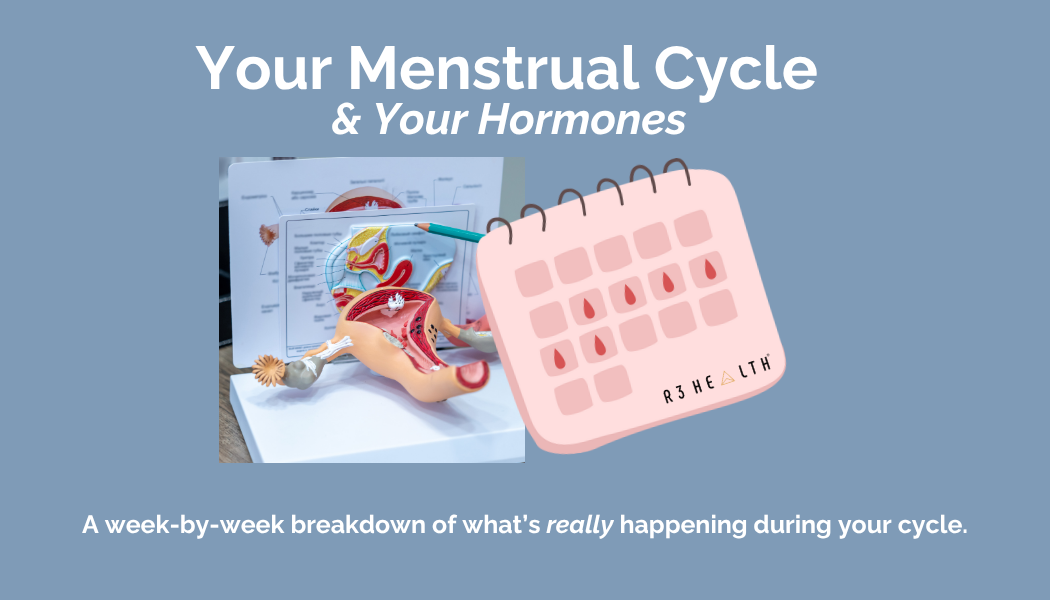If you’ve ever felt like a different person from one week to the next, more tired, more emotional, or more energized, you’re not imagining it. It’s your cycle. And it’s driven by powerful hormones that influence everything from your energy levels to your skin, sleep, cravings, and mood.
At R3 Health, we believe that understanding your hormones is key to optimizing your health, not just during your period, but throughout your entire cycle. Below, we break down each phase of your menstrual cycle, the most common symptoms, and the lab markers that can help you better understand what your body is telling you.
Phase 1: Menstrual Phase (Days 1–5)
This is the start of your cycle: your period.
Hormones:
- Estrogen and progesterone are at their lowest levels.
- Your body is shedding the uterine lining it built up last month.
Common Symptoms:
- Low energy and fatigue
- Cramps and bloating
- Mood changes or emotional sensitivity
Helpful Lab Markers:
- Estradiol (E2) – typically low
- Progesterone – low
- Ferritin (iron stores) – can be low if you bleed heavily
Phase 2: Follicular Phase (Days 6–13)
Your body is building back up after your period.
Hormones:
- Estrogen begins to rise
- FSH (Follicle-Stimulating Hormone) stimulates egg development
Common Symptoms:
- Increased energy and mental clarity
- Improved mood
- Clearer skin and better workouts
Helpful Lab Markers:
- Estradiol – begins rising
- FSH and LH – still low but active
Phase 3: Ovulation Phase (Around Day 14)
Your body releases an egg. This is your most fertile window.
Hormones:
- Estrogen peaks
- LH (Luteinizing Hormone) surges to trigger ovulation
- Progesterone begins to rise
Common Symptoms:
- Higher libido
- Boosted confidence and mood
- Slight bloating or mild one-sided cramping
Helpful Lab Markers:
- LH – surges sharply
- Estradiol – at its peak
- Progesterone – begins to rise post-ovulation
Phase 4: Luteal Phase (Days 15–28)
If no pregnancy occurs, hormone levels drop and your cycle restarts.
Hormones:
- Progesterone rises, then falls
- Estrogen drops gradually
- Cortisol sensitivity may increase
Common Symptoms:
- PMS: mood swings, cravings, bloating
- Breast tenderness
- Low motivation or energy
Helpful Lab Markers:
- Progesterone – peaks ~Day 21 (confirm ovulation)
- Estradiol – declines
- Cortisol and DHEA – may impact PMS symptoms
Why You Should Track Your Cycle
One of the most powerful tools for hormone health? Cycle tracking. Whether you use a journal, an app, or a wearable device, tracking your cycle gives you real-time data on how your hormones are impacting your body and mind.
What You Can Track:
- Period length and flow
- Ovulation signs (like basal body temperature, cervical mucus)
- Mood, energy, sleep, and skin changes
- Symptoms like cramping, bloating, cravings, or headaches
- Best Cycle Tracking Apps:
- Clue – science-backed and great for symptom tracking
- Natural Cycles – FDA-cleared for fertility awareness
- Flo – user-friendly with hormone education
- Oura Ring – wearable options for deeper insights (R3 Health Patients get 25% off!)
Why It Matters:
Tracking your cycle helps you:
- Identify patterns in symptoms and mood
- Understand when to test hormones for accurate results
- Time your workouts, social events, or self-care with your hormonal rhythm
- Advocate for yourself with your provider using real data
When Should You Test Your Hormones?
Hormone testing gives insight into whether your cycle is functioning optimally. At R3 Health, we use lab testing to identify imbalances and tailor treatments that align with your symptoms and lifestyle.
Hormone Testing Timeline:
- Day 3: Best for testing baseline estrogen, FSH, LH, and AMH
- Day 21: Ideal for progesterone to confirm ovulation
- Anytime: Thyroid, cortisol, DHEA, insulin, and other metabolic markers
You Deserve to Understand Your Cycle
If you’re dealing with fatigue, mood swings, acne, weight fluctuations, or irregular periods, your hormones might be trying to tell you something. When you understand how each part of your cycle works, you can work with your body instead of feeling constantly out of sync.
At R3 Health, we’re here to help you make sense of your labs, symptoms, and health goals, whether you’re trying to balance hormones naturally, improve fertility, or just feel more like yourself every week of the month.
Ready to get to know your hormones better?
Book your personalized hormone consultation with R3 Health and take control of your cycle for good.




